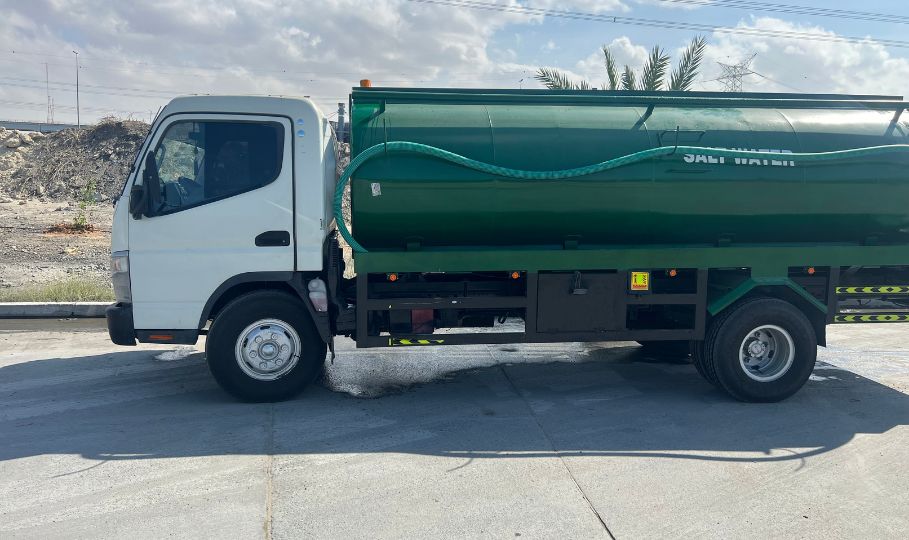Dubai’s construction industry is known for its innovation and scale, continuously pushing the boundaries of architectural and engineering possibilities. An often overlooked component in many of these projects is the use of saltwater. Whether for cooling systems, concrete curing, or other specialized applications, the demand for saltwater in construction is growing. This guide will explore the essential aspects of saltwater delivery for construction projects in Dubai, highlighting its benefits, process, and practical considerations.
Why Use Saltwater in Construction Projects?
Benefits of Saltwater in Construction
- Enhanced Concrete Curing: Saltwater can be used in the curing process of concrete. This method can improve the strength and durability of concrete structures, which is particularly beneficial in Dubai’s harsh climate.
- Cooling Systems: Many large construction sites use saltwater in their cooling systems to maintain optimal temperatures for equipment and materials.
- Cost-Effectiveness: Saltwater can be more economical than potable water, especially in large quantities needed for major construction projects.
- Environmental Considerations: Utilizing saltwater can reduce the strain on freshwater resources, aligning with sustainable construction practices.
Applications of Saltwater in Construction
- Concrete Mixing and Curing: Improves the long-term durability and resistance of concrete.
- Dust Control: Helps in reducing dust levels on construction sites, improving air quality and worker safety.
- Hydrostatic Testing: Used in testing the integrity of pipelines and tanks for leaks.
The Growing Need for Sustainable Solutions
Dubai’s construction boom has been nothing short of phenomenal. From the iconic Burj Khalifa to the futuristic Museum of the Future, the city’s ambition knows no bounds. However, this rapid growth comes with a hidden cost: the pressure on freshwater resources. Dubai experiences a naturally arid climate with limited rainfall, making freshwater a precious commodity. While desalination plants play a vital role, they are energy-intensive and can have environmental impacts.
This is where saltwater delivery steps in as a sustainable alternative. By utilizing readily available seawater for specific construction applications, companies can significantly reduce their reliance on freshwater. This not only conserves a vital resource but also aligns with Dubai’s growing commitment to environmental sustainability.
The Advantages of Saltwater Delivery: More Than Just Cost-Savings
While cost-effectiveness is certainly a major advantage of saltwater delivery, its benefits extend far beyond the bottom line. Let’s explore some key aspects that make it a compelling choice for construction projects in Dubai.
- Targeted Water Use: Traditionally, construction projects rely heavily on freshwater for various tasks. However, this “one size fits all” approach isn’t always necessary. Saltwater delivery allows for a more strategic water usage plan. Freshwater can be reserved for crucial tasks like concrete mixing, where its specific properties are essential. Meanwhile, saltwater can be used for a variety of other applications, significantly reducing the overall demand for freshwater.
- Dust Suppression: Dubai’s construction sites are often plagued by dust, posing a health hazard for workers and surrounding communities. Saltwater is a highly effective and environmentally friendly solution for dust suppression. Spraying exposed surfaces with saltwater creates a temporary film that binds dust particles, minimizing the risk of airborne pollutants.
- Soil Compaction: Achieving optimal soil density is crucial for the stability of any construction project. Saltwater can be used effectively for soil compaction, especially in situations where using freshwater might be undesirable due to cost or potential environmental impact
- Road Wetting: During construction, temporary roads are often created to facilitate material movement and equipment access. These roads can become dusty and deteriorate quickly, especially under Dubai’s harsh sun. Saltwater can be used to wet these roads, minimizing dust generation and extending their lifespan.
- Cost Savings: Saltwater is readily available and significantly cheaper than freshwater. This translates to substantial cost savings for construction projects, especially for large-scale developments requiring significant water usage.
The Saltwater Delivery Process: From Planning to Application
Integrating saltwater delivery into your construction project requires careful planning and execution. Here’s a step-by-step breakdown of the process:
- Choosing a Reputable Provider: The first step is to identify a reliable saltwater delivery service provider. Look for companies with a proven track record, a commitment to safety and environmental regulations, and a fleet of well-maintained tankers.
- Planning and Permitting: Work closely with your chosen provider to plan your saltwater requirements. This involves determining the volume of water needed, delivery frequency, and storage needs on-site. The provider will also guide you through any necessary permitting processes to ensure compliance with local regulations.
- Delivery and Storage: Saltwater is typically delivered by specialized tanker trucks equipped with pumps and spraying mechanisms. The provider will determine the best storage solution based on your project’s needs. This could involve on-site tanks or portable storage containers. The provider will handle the logistics of delivery and ensure a consistent supply throughout the project duration.
- On-Site Applications: Saltwater is used for various purposes on construction sites. Dust suppression is a primary application, achieved by spraying the water onto exposed surfaces. Using specialized sprayers or nozzles ensures optimal coverage and minimizes water waste. For soil compaction, saltwater can be applied through controlled methods to achieve the desired density. Wetting temporary roads with saltwater minimizes dust and extends their usability.
Conclusion
Saltwater delivery is an invaluable resource for construction projects in Dubai, offering numerous benefits from cost savings to improved concrete durability. By understanding the delivery process, ensuring quality and compliance, and selecting the right service provider, construction companies can optimize their operations and contribute to sustainable building practices. Whether you’re working on a high-rise tower or a sprawling infrastructure project, integrating saltwater into your construction process can lead to enhanced results and long-term success. If you are looking for a high-quality saltwater delivery in Dubai Call us at +971 52 559 9726.
FAQS
Q. What types of construction projects benefit from saltwater delivery?
A. Projects that involve concrete curing, large cooling systems, or hydrostatic testing particularly benefit from saltwater delivery. This includes infrastructure projects, high-rise buildings, and industrial facilities.
Q. How is the quality of saltwater ensured?
A. Reputable delivery services conduct rigorous testing and adhere to industry standards to ensure the saltwater meets the necessary quality criteria for construction use.
Q. Is saltwater delivery cost-effective?
A. Yes, saltwater delivery can be more cost-effective than using freshwater, especially for large-scale projects. It also supports sustainable practices by conserving freshwater resources.
Q. Can saltwater be used for any type of concrete?
A. While saltwater can be beneficial for certain types of concrete, it’s essential to consult with construction and engineering experts to ensure compatibility with your specific project requirements.



